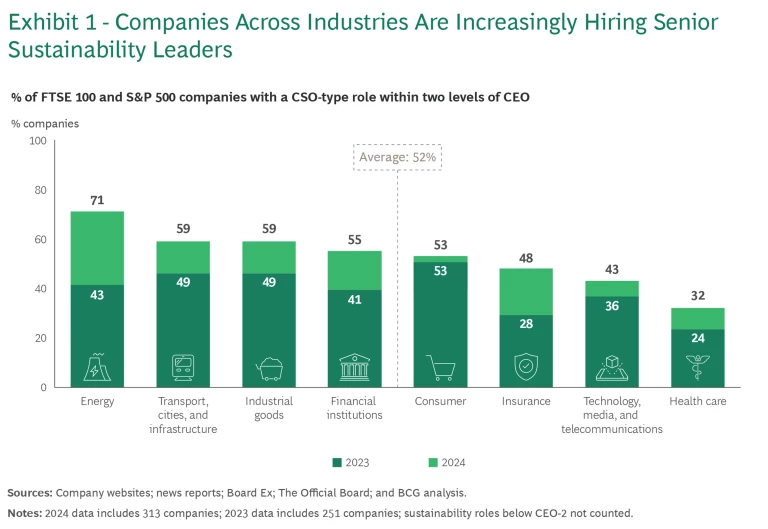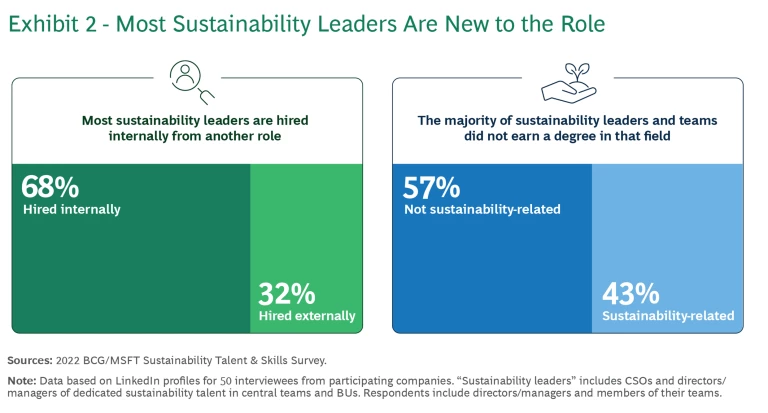As
sustainability
becomes a core part of a company’s strategy, more companies are appointing chief sustainability officers (CSOs) to help achieve their goals and turn
sustainability into a source of value creation
. These leaders are taking on a massively complex challenge—blending environmental stewardship, corporate responsibility, and profitability—and they must have a plan for success.
The So What
A new CSO’s first 100 days are a critical window of opportunity. Incoming leaders should start with a well-structured, 100-day plan to manage the role’s complexities and make an early impact. This approach can also be valuable for seasoned CSOs reassessing their strategies and charting a clear path forward.
Among companies in the S&P 500 and FTSE 100, 52% now have a senior sustainability leader within the top two levels of the organization, an increase of 10 percentage points in the past year. (See Exhibit 1.) Our previous research also found that most sustainability leaders have been hired internally , and the majority do not have formal sustainability expertise. (See Exhibit 2.)


In part, the rise of the CSO role stems from growing numbers of organizations setting ambitious and high-profile sustainability targets—and frequently struggling to meet them. According to the Science Based Targets Initiative, more than 4,200 companies had an approved greenhouse gas emissions reduction target by the end of 2023, a 102% increase since 2022.
Our conversations with CSOs and sustainability leaders across industries highlight four challenges they face in helping hit such targets:
- Driving big change, with limited authority. A CSO’s direct team and budgets are often small, but they must inspire others to action and generate change across all parts of the business.
- Mastering many skills. A CSO needs to master strategy, storytelling, influencing, technical expertise, regulation, and executional certainty. One person will inevitably have gaps in their capabilities and experience.
- Forging a new trail. CSOs may encounter skepticism and extra scrutiny from fellow executives who are not yet convinced of the role’s value or may not understand its remit—with few role models or mentors who have been there before.
- Addressing intractable problems. CSOs will need to navigate and make progress against some apparently insurmountable problems linked to sustainability. In a recent BCG survey, only 11% of companies report being on track against emissions reduction targets. At the same time, ESG regulations and reporting requirements are becoming more complex .
Now What
Our research highlights five must-dos for new CSOs in their first 100 days—or for sustainability leaders who need to reboot their agenda, such as when a new CEO is hired.
Understand the CEO’s sustainability ambition and your true mandate. As one sustainability leader at a consumer goods company said, “Ask your CEO: Why am I here?” Before stepping into the role, a new CSO should have an open and forthright conversation with the CEO to understand the parameters of the role. Key questions include:
- What is the CEO’s level of ambition and urgency around sustainability, and how will this be measured?
- How will they support the CSO to achieve influence and authority? What resources will be available?
- Is the role’s mandate focused on compliance or transformation?
A CSO can and should shape this agenda, but the ultimate responsibility for setting the company’s level of ambition lies with the CEO.
Do enough due diligence to understand the baseline. Starting on day one, a CSO should thoroughly assess the current state of sustainability in the organization and understand the value drivers of the business. As the CSO of a global professional services company told us, “Your first objective should be to ‘get smart.’” This due diligence falls into three main areas:
- Strategic agenda: Is there a clear sustainability agenda that addresses material topics, with well-defined strategic priorities, roadmaps, and targets underneath?
- Operating model and governance: Are the right structures, skills, governance processes, and incentives in place to create accountability across the organization?
- Data and compliance: How good is data, and what technology exists to support tracking? Is compliance with relevant policy and regulation on track?
Connect internally and externally. New CSOs should engage with stakeholders to understand their views, concerns, and ideas. They should identify potential allies, as well as influential critics whose concerns will have to be addressed. “It’s your honeymoon period,” said the CSO of an industrial goods company. “You need to build relationships fast.” Important groups include the board of directors; leaders of key business units; and major investors, suppliers, and customers.
Set a manageable number of priorities. Based on their due diligence and listening tour, CSOs should then settle on three to five flagship priorities, telling a compelling story of what the organization must focus on and why it matters. “You can’t do it all,” said the CSO of a global pharmaceutical company. “Be able to say what differentiates you.”
The priorities should be strategic and should encompass three broad areas of focus:
- Understand and mitigate risks from climate (including physical risks).
- Make the core business more sustainable.
- Identify new areas of growth .
Spending time to communicate these priorities to the whole organization and listening to feedback will help build support and enthusiasm.
Kickstart the change with some no-regrets moves. Finally, the CSO should identify some quick wins to generate impact, build momentum, and send a signal to the organization and externally. These could include selecting a set of flagship sustainability KPIs to track, establishing a presence externally at industry events and in the media, and launching green office initiatives like designating a Sustainability Day or celebrating sustainability champions internally.
What Else
Tailor your plan to meet your unique circumstances.
- An internally promoted CSO will likely need to focus disproportionately on shaping and positioning sustainability priorities, building support for these internally, and showing early progress through quick wins.
- An external hire may need to spend more time on building influence, allies and networks, as well as on a thorough diagnostic to truly understand the company’s starting point.
- An incumbent looking for a reboot will need to carefully understand their new mandate and any changed expectations, and to spend sufficient time telling a strong story around new priorities and why they matter.
Last, the 100-day plan should be fully drafted and ready to implement on day one. New CSOs should find a trusted mentor, coach or advisor to act as a sounding board to support them during their early months. And, critically, they should limit changes to the plan—one early revision at most, in the first month, based on feedback from the CEO and other senior leaders.











